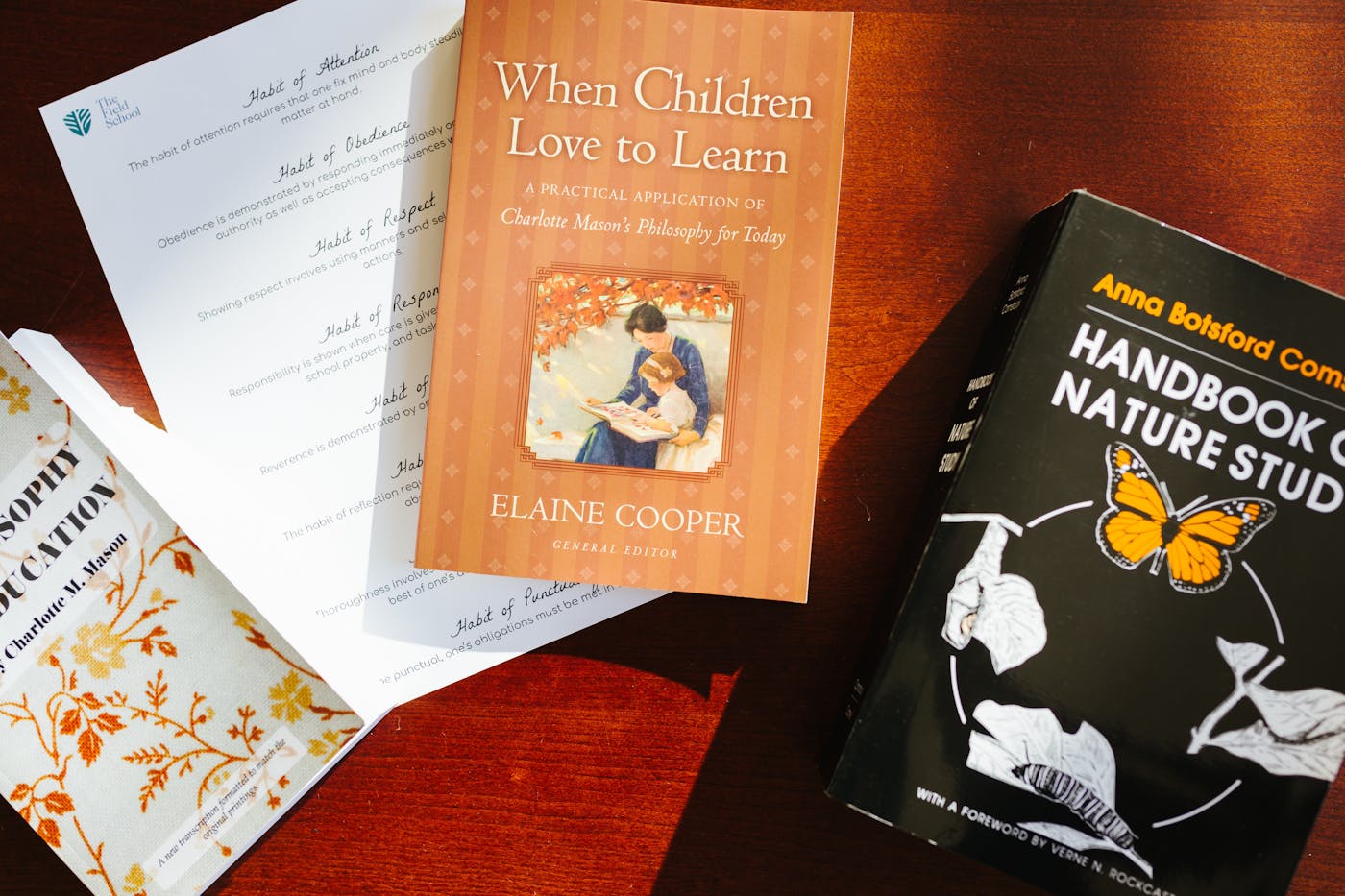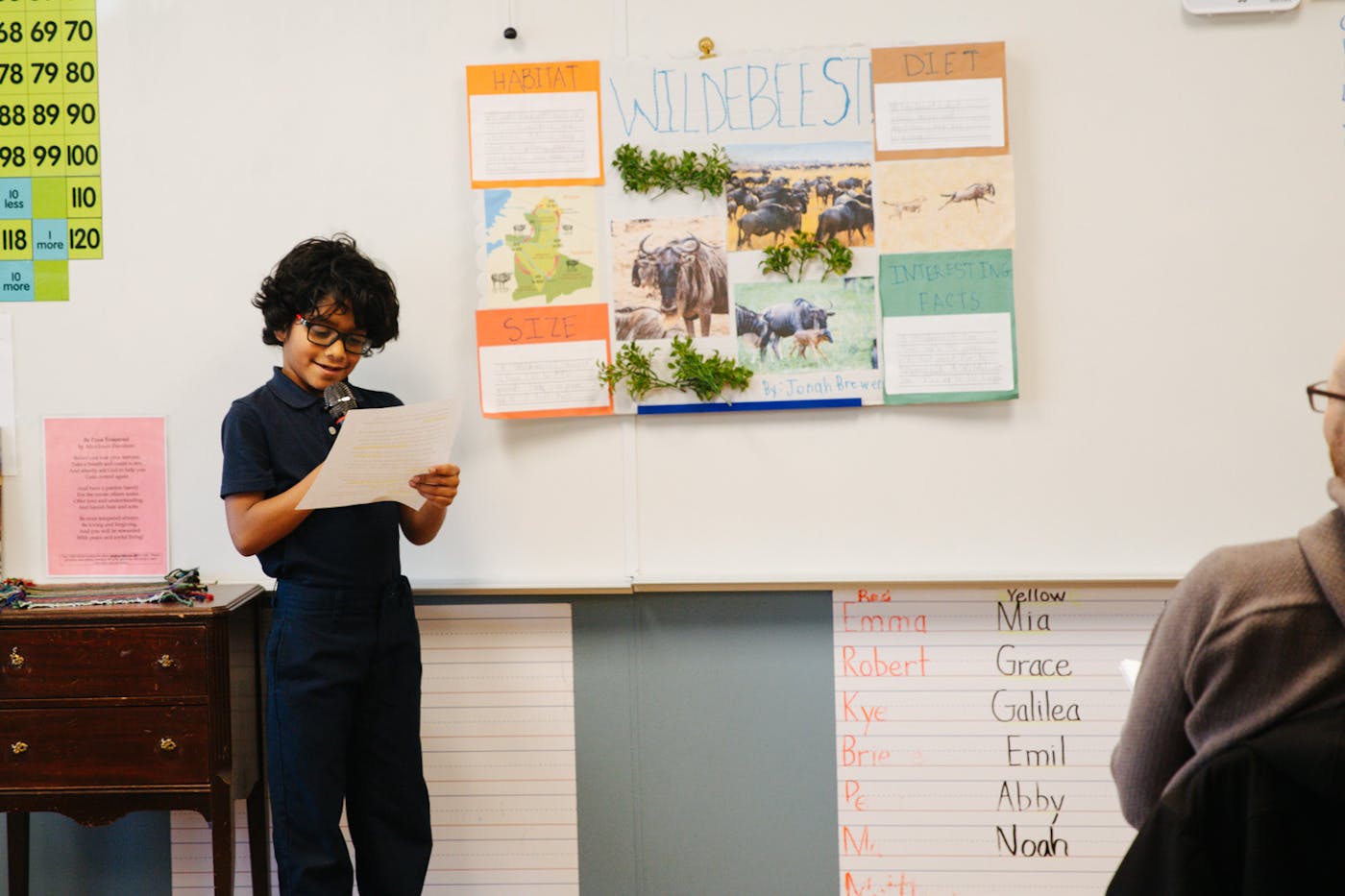Academics
The Field School is animated by the dream of providing exceptional education to children from all backgrounds in the name of Jesus. We are committed to the rigorous, holistic approach of Christian classical model of education, supplemented by the insights of education theorist Charlotte Mason. In low-tech classrooms and the outdoors, students learn to study rich content that has persisted throughout the centuries. Their affections are shaped by things that are good, true, and beautiful.




Classical Education and Charlotte Mason
The Field School draws from the tradition of Christian classical education and the pedagogical methods of Charlotte Mason, helping children develop all their capacities as image-bearers of God. Our primary educational objective is personal formation—intellectual, moral, physical, and spiritual. Believing relationships come first, we have intimate classrooms to ensure that every student is known, cherished, and challenged according to his or her personality and needs.
The souls of children are waiting for the call of knowledge to awaken them to delightful living.
Classical education believes proficiency in language arts and mathematics funds self-learning for a student’s whole life. We train students to read primary sources, write clearly and critically, speak confidently and persuasively, and understand mathematical concepts in both theory and practice. In a classical education classroom, the text (whether a book, a piece of music, or something from nature) drives learning, not the teacher or the students. This pedagogical orientation stands in contrast to most public school classrooms, where the teacher leads instruction using textbooks and worksheets, or a student-centered classroom (some Montessori, Reggio Emilia, Sudbury schools), where students pursue their own interests with minimal structure.
While we are committed to providing the very best instructional methods and curriculum, we also take a much wider view of what we are hoping to achieve, believing that education has eternity as its horizon. Test scores, high school and college placement, and successful professions are not irrelevant, but they pale in comparison to helping children become all that they were created to be. Communion with God, delight in what he has made, and service to others—these are the fruits we seek to cultivate. We desire to develop mature people who are equipped to navigate a complex, changing world.
Simply old time-glorified methods of delving for truth, and searching out the hidden beauties of life, and learning the good of living… this course of study will not change, ever having one goal—not to earn meat, but to know the end and aim of that life which meat nourishes.



Personhood of the Child
At The Field School, each child is viewed and treated as a whole person—an image-bearer of God and someone with extraordinary capacity and an eternal future. Recognizing the personhood of the child, each student is treated with dignity, respect, and individualized love and care.
We appreciate the innate curiosity, wonder, and delight of our students, as well as their capacity to honor proper authority and make wise choices. As a result, we have high expectations for our students while acknowledging the unique strengths, weaknesses, and insights of each individual.

Habit Formation
Rather than managing behavior through extrinsic or artificial incentives, we aim to teach and train students so that they grow to embody habits that will allow them to live, learn, and serve well not only in the classroom but also more broadly in life. Habit formation is the tool and process used to develop character, strengthen relationships, and provide a foundation for intellectual, spiritual, and physical development.
The habits are based on Charlotte Mason's foundational approach to character development, which can be summarized in the following motto: I am, I can, I ought, I will.
- I am: recognize the God-given, unique self-worth of each child
- I can: reaffirm the great potential in each child to achieve high, realistic goals
- I ought: recognize the Truth, which guides and instructs
- I will: realize that each child must choose to do what is right amidst challenges
The function of education is to teach one to think intensively and to think critically. Intelligence plus character — that is the goal of true education.”
Listed in the order that they are added at the grade levels, all of these habits are promoted throughout the school community, but certain habits are a focus at each grade level. The habits are cumulative, so that when students reach middle school, they are responsible for every habit.
Pre-K — 1st Grade
- Attention
- Obedience
- Respect
- Responsibility
2nd — 5th Grade
- Reverence
- Reflection
- Thoroughness
- Fortitude
- Punctuality
6th — 8th Grade
- Service
- Self-Control
- Integrity

Curriculum
The Field School aims to provide an education that is both timeless and timely. The curriculum draws from the liberal arts and sciences, classic literature, and art and music, with a heavy focus on the humanities. Students are given a broad horizon, studying ancient civilizations, the history of the church, and wider world history. Art, music, athletics, and experiencing the outdoors are also an integral part of our curriculum.
As a diverse school, we prioritize the perspectives and experiences of the communities we serve throughout the curriculum. All students grapple with diverse thinkers, texts, and artwork, because we believe that studying content from diverse backgrounds encourages students toward a deeper love of neighbor, more robust self-expression, and fuller appreciation of the beautifully complex world God has created.
Explore the CurriculumIf we work upon marble, it will perish; if we work on brass, time will efface it. But if we work on men’s immortal minds, if we impress on them high principles, the just fear of God, and love for their fellow-men, we engrave on those tablets something which no time can efface, which will brighten and brighten to all eternity.